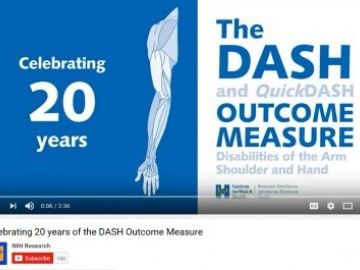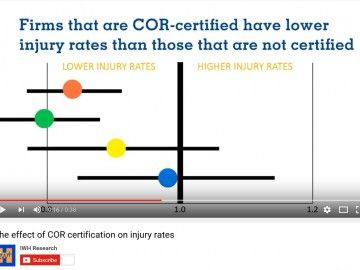What's new

Evidence suggests packages of different types of interventions improve RTW success
Effective workplace programs to help injured and ill workers return to their jobs are multi-faceted. They offer some combination of health services, return-to-work (RTW) coordination and work modifications. That’s according to a recent systematic review update conducted by the Institute for Work & Health (IWH) and the Institute for Safety, Compensation and Recovery Research (ISCRR). It also finds work-related cognitive behavioural therapy improves RTW for workers with mental health conditions. Read the open access article or find out more in At Work.

Health-care providers face workers’ compensation challenges when dealing with complex injuries: IWH study
Most health-care providers, when treating acute and visible injuries, find the workers’ compensation system and return-to-work process relatively straightforward. But when treating patients with gradual onset, invisible or complex conditions, the challenges can be many. A new study by the Institute for Work & Health (IWH) examines the challenges from the perspectives of health-care providers and case managers in four provinces. Dr. Agnieszka Kosny shared the findings at a recent plenary and in an At Work article, now online.

Paper on aging and MSDs draws on WHO framework
With an aging workforce in Canada, there may be concerns that musculoskeletal disorders may be more prevalent and costly. While the evidence on this question is inconclusive, some current research suggests that supporting healthy aging in workplaces will benefit society in general. That’s the message from a recent position paper prepared by a team of researchers from the Institute for Work & Health IWH for the Centre of Research Expertise for the Prevention of Musculoskeletal Disorders.

Employers wanted for study on OHS spending
How much do Ontario employers spend to prevent work-related injuries and illnesses? A team of researchers at the Institute for Work & Health (IWH) has set out to answer this question in the first study of its kind in Canada. The research team is now actively seeking other Ontario employers to join the study. The goal is to recruit 350 organizations across different sectors, in proportions representative of the labour force in the province.

New video looks at the success of the DASH
In the early 1990s, there was a growing recognition of the need for patient-reported outcome measures for musculoskeletal conditions and injuries affecting the upper limb—the arm, shoulder or hand. That was why a team at the Institute for Work & Health and the American Academy of Orthopedic Surgeons developed the DASH Outcome Measure. Twenty years later, the DASH is used across the world in more than 50 languages. Its impact is felt in both research and clinical settings. In this video, DASH developers talk about why they think it's stood the test of time.

Cochrane Back and Neck review finds yoga may help people with chronic low-back pain
Low-back pain is a common health problem, sometimes lasting for longer than three months in what’s called “chronic” pain. A new review by Cochrane Back and Neck, housed at the Institute, looks at yoga for treating this condition. It finds moderate evidence that yoga is more effective than non-exercise controls for back-related functioning at six months, and for pain at three to four months.

IWH in the media: Doctors frustrated workers’ compensation boards seem to ignore medical opinions, report says
"They are the first port of call for workers hurt on the job. But when decisions are made about accident victims with complex injuries, a new study suggests doctors feel sidelined by workers’ compensation boards. The report, conducted by the independent, Toronto-based Institute for Work and Health, examined the role of doctors and other health care professionals in workers’ compensation across four provinces, including Ontario," writes Toronto Star's Sara Mojtehedzadeh.

IWH Updates - Summer 2016
2016 Nachemson to honour RTW pioneer ~ CARWH 2016 takes place this fall in Toronto ~ IWH senior scientist honoured with award ~ Welcome to new associate scientist

Study by IWH scientist explores the link between COR certification and injury rates
The Certification of Recognition (COR) program recognizes and rewards employers that have robust occupational health and safety (OHS) and return-to-work policies. But do these employers actually have lower injury rates? That was the key question behind a study led by Dr. Chris McLeod of the Institute for Work & Health (IWH) and the University of British Columbia’s Partnership for Work, Health and Safety. The findings, reported on in the Spring 2016 issue of At Work, are also summed up in a new video card. Check it out and please share!